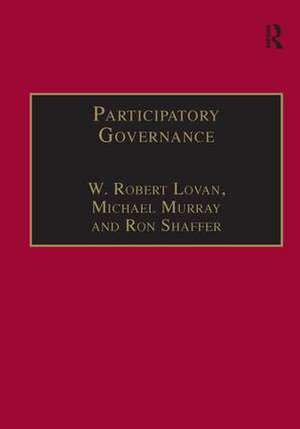Participatory Governance: Planning, Conflict Mediation and Public Decision-Making in Civil Society
Editat de W. Robert Lovan, Michael Murray, Ron Shafferen Limba Engleză Paperback – 30 noi 2016
| Toate formatele și edițiile | Preț | Express |
|---|---|---|
| Paperback (1) | 338.33 lei 6-8 săpt. | |
| Taylor & Francis – 30 noi 2016 | 338.33 lei 6-8 săpt. | |
| Hardback (1) | 768.46 lei 6-8 săpt. | |
| Taylor & Francis – 28 dec 2003 | 768.46 lei 6-8 săpt. |
Preț: 338.33 lei
Preț vechi: 386.77 lei
-13% Nou
Puncte Express: 507
Preț estimativ în valută:
64.74€ • 67.59$ • 53.58£
64.74€ • 67.59$ • 53.58£
Carte tipărită la comandă
Livrare economică 05-19 aprilie
Preluare comenzi: 021 569.72.76
Specificații
ISBN-13: 9781138250499
ISBN-10: 113825049X
Pagini: 288
Dimensiuni: 152 x 229 mm
Greutate: 0.45 kg
Ediția:1
Editura: Taylor & Francis
Colecția Routledge
Locul publicării:Oxford, United Kingdom
ISBN-10: 113825049X
Pagini: 288
Dimensiuni: 152 x 229 mm
Greutate: 0.45 kg
Ediția:1
Editura: Taylor & Francis
Colecția Routledge
Locul publicării:Oxford, United Kingdom
Cuprins
Contents: Foreword, Christian Huillet. Section I: Introduction: Participatory governance in a changing world, W. Robert Lovan, Michael Murray and Ron Shaffer. Section II: Institutional Perspectives on Participatory Governance: Evolving participatory governance and developmental local government in post-apartheid South Africa, Etienne Nel; Local government, local development and citizen participation: lessons from Ireland, Jeanne Meldon, Michael Kenny and Jim Walsh; The national rural development partnership in the United States: a case study in collaboration, Richard Gardner and Ron Shaffer; Governance and community engagement: the Australian experience, Jim Cavaye; Faith based service programs in the public sector: illustrations from Virginia of faith in action, Randall Prior. Section III: Operational Dimensions of Participatory Governance: Regional transportation strategies in the Washington, DC area: when will they be ready to collaborate?, W. Robert Lovan; Conflict management and collaborative problem-solving in a protected area in Ghana, David Deshler and Kirby Edmonds; Participatory regional planning in Northern Ireland, Michael Murray and John Greer; From enemies, to higher ground, to allies: the unlikely partnership between the tobacco farm and public health communities in the United States, Frank Dukes; Rural action: participatory planning for healthy communities in Appalachian Ohio, Christopher S. Rice and Carol Kuhre; Advancing knowledge and capacity for community-led development in rural America, Norman Reid and Cornelia Butler Flora; Managing partners: performance based contracting in Baltimore's empowerment zone, Robert Stoker. Section IV: Reflections on Participatory Governance: Interactive public decision-making in civil society, W. Robert Lovan, Michael Murray and Ron Shaffer; Index.
Notă biografică
W. Robert Lovan, Michael Murray, Ron Shaffer
Descriere
In recent years a new participatory governance dynamic has been redefining relationships and responsibilities in the planning and implementation of policies and programs. Participatory governance not only crosses public, private and associational sectors, but is also intra-organizational. It allows for individual and collective participation, and challenges longstanding norms of institutional behavior. This book examines fresh evidence relating to planning, conflict mediation and public decision-making processes in civil society by bringing together a multi-disciplinary team of practitioners and scholars from North America, Europe, Africa and Australia. In an analysis which spans institutional perspectives and operational concerns, the contributors explore the dynamics of stakeholder involvement as deliberative processes constructed around the core idea of shared responsibility. The book draws out important principles as to how this diversity of engagement can translate itself into more effective public decision-making.













